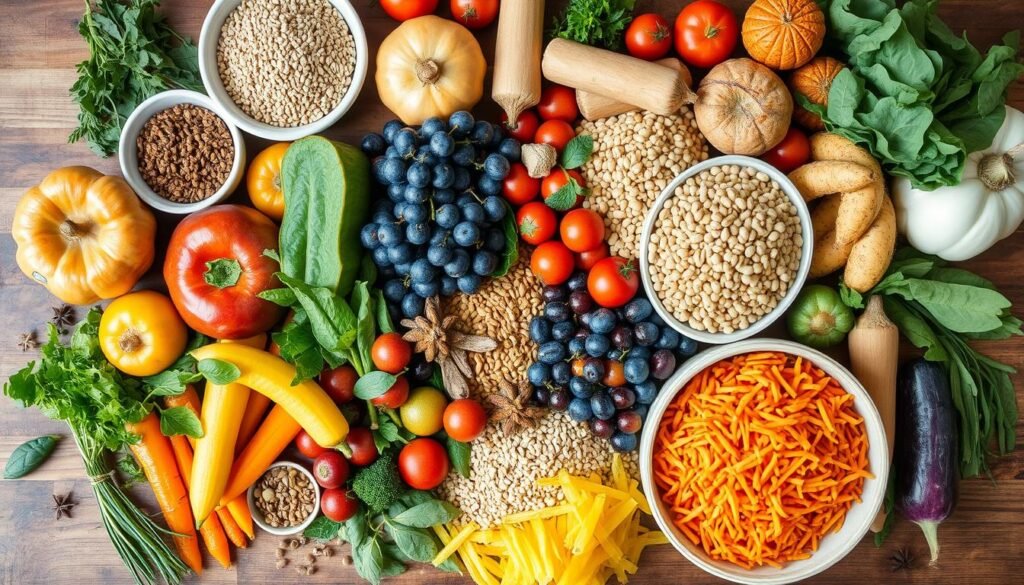Did you know about 1 in 10 women deal with Polycystic Ovarian Syndrome (PCOS) during their fertile years? This health issue can make everyday life hard due to hormonal imbalances. One common problem is painful menstrual cramps that stop women from doing their daily tasks.
But there’s good news. Many natural ways can help lessen PCOS cramps and improve comfort. Changes in diet, getting regular exercise, and using heat therapy are some strategies that help. To learn effective ways to manage menstrual pain with PCOS, click the link.
Key Takeaways
- PCOS affects around 116 million women globally.
- Regular exercise is essential for managing PCOS symptoms.
- Dietary changes, including high-fiber foods, are beneficial for symptom relief.
- Heat therapy can provide significant relief from menstrual pain.
- Consulting healthcare professionals can lead to personalized treatments.
Understanding PCOS and Its Symptoms
Polycystic Ovarian Syndrome (PCOS) affects nearly 1 out of 10 women of childbearing age. It’s one of the most common endocrine disorders. Sadly, about 70% of women with PCOS don’t know they have it. This condition involves hormonal imbalances. These can cause symptoms by disrupting the body’s natural functions.
What is Polycystic Ovarian Syndrome?
PCOS is a health issue caused by hormonal imbalances. These imbalances often lead to ovarian cysts. These cysts are sacs full of fluid on the ovaries, leading to pcos symptoms. PCOS is also related to insulin resistance. This plays a big part in the metabolic problems that can occur over time.
Common Symptoms of PCOS
Common pcos symptoms include:
- Irregular periods
- Weight gain, especially around the stomach, known as “PCOS belly.”
- Thinning hair or hair loss
- Acne and oily skin
- Excess hair growth on the face and body
About half of people with PCOS gain weight. Almost 95% have some irregular menstrual cycles. These symptoms can cause emotional pain. It’s important to find good ways to manage them. Changing your lifestyle and getting help for mental health is crucial. Practices like mindfulness and meditation are really helpful. For more tips, check out effective stress reduction methods.
The Role of Hormonal Imbalance in PCOS
A major issue with PCOS is the hormonal imbalance it causes. This includes high levels of androgens. Insulin resistance is a big contributor. It affects ovulation and reproductive health. Research shows 30% to 80% of women with PCOS are insulin resistant. This can lead to weight gain and more health issues, like type 2 diabetes. Hormonal changes also increase the risk of problems like anxiety and depression.
To manage PCOS symptoms, we need both medical and lifestyle changes. Knowing more about PCOS helps. It allows women to better manage symptoms and improve their life quality.
What Causes PCOS Cramps?
To manage PCOS cramps well, it’s crucial to know what causes them. Ovarian cysts, dysmenorrhea, and high levels of prostaglandins are key factors. They all contribute to the pain in the pelvis and during periods.
The Impact of Ovarian Cysts
Ovarian cysts are common in those with PCOS. Not all cysts cause problems, but the larger ones can hurt a lot. They can press on nearby areas, making the pain worse. Knowing about these cysts helps us figure out the pain and how to treat it.
Menstrual Pain Related to Dysmenorrhea
Dysmenorrhea means really painful period cramps. In women with PCOS, hormone issues can make the pain even worse. This can make doing everyday stuff hard. It’s important to find natural ways and lifestyle changes to lessen the pain.
The Connection between PCOS and Prostaglandins
During your period, your body makes chemicals called prostaglandins that make the uterus contract. Women with PCOS tend to have more prostaglandins, which means more pain. Understanding this can help us find ways to feel better by tackling prostaglandin levels.
Natural Strategies for Easing PCOS Cramps
Looking for ways to ease PCOS cramps can really make a difference. By adding natural strategies into your day, you can lessen menstrual pain and feel better overall. Two key approaches are exercising regularly and doing stretching and yoga.
Incorporating Regular Exercise
Exercise is key for women with PCOS. Mixing aerobic with strength-training workouts three to five times a week can ease cramps and boost insulin sensitivity. Try walking fast, swimming, or group fitness to help balance hormones and manage PCOS symptoms better.
The Benefits of Stretching and Yoga
Stretching and yoga do wonders for PCOS cramps and tension. Yin yoga, for instance, lengthens muscles to ease pelvic pain. These activities also lower stress and help you relax, making you feel mentally better while dealing with PCOS. Adding these exercises can cut down muscle tightness and brighten your mood.

Dietary Changes to Alleviate PCOS Cramps
Changing your diet can be a big help for women with Polycystic Ovary Syndrome (PCOS). An anti-inflammatory diet full of whole foods fights chronic inflammation. It also greatly improves your health and happiness.
Foods to Include for Anti-Inflammatory Benefits
Eating foods that fight inflammation is key for anyone with PCOS. Leafy greens like kale and spinach are full of vitamins and minerals. They help fight inflammation. Berries, nuts, and spices like turmeric are also good for balancing hormones.
Balancing Carbohydrates and Proteins
Managing carbs and protein intake can help control blood sugar. Choosing complex carbs like whole grains and plant-based proteins keeps blood sugar steady. Avoiding refined carbs and added sugars is critical for those with PCOS because of insulin resistance issues.
Importance of Omega-3 Fatty Acids
Omega-3 fatty acids are important for reducing inflammation and helping with insulin sensitivity. Foods high in omega-3, like salmon, walnuts, and flaxseeds, should be a key part of your diet. They help with managing symptoms and improving overall health.

For more details on how to adjust your diet for PCOS, check here. By eating nutritious whole foods and making these changes, you can better manage your PCOS symptoms.
| Food Category | Examples | Benefits |
|---|---|---|
| Anti-inflammatory foods | Kale, spinach, berries, turmeric | Combat chronic inflammation, support hormonal balance |
| Complex carbohydrates | Quinoa, brown rice, whole grain bread | Stabilize blood sugar levels, support energy |
| Protein sources | Legumes, nuts, fatty fish | Improve insulin sensitivity, provide essential nutrients |
| Omega-3 fatty acids | Salmon, walnuts, flaxseeds | Reduce inflammation, enhance reproductive health |
Using Heat Therapy for Pain Relief
Heat therapy is a useful way to relieve cramps caused by PCOS. It helps many people feel better. Adding heat to your care plan can greatly improve comfort and wellness.
How Heating Pads Can Help
Heating pads provide targeted pain relief for PCOS cramps. Using one for 15 to 20 minutes can boost blood flow and relax muscles, especially around the pelvis. This helps ease muscle tightness and reduces discomfort from various menstrual issues. Over 71,000 members of myPCOSteam use heating pads or hot water bottles for cramp relief.
People often choose electric heating pads with an automatic shutoff for safety. It’s key to avoid pads with damaged wires or holes to prevent accidents. The warmth from the pad can significantly lessen menstrual pain and tension.
Benefits of Hot Baths for Menstrual Pain
Hot baths are also great for easing menstrual pain linked to PCOS. The warm water helps relax muscles and improves blood circulation, making cramps less painful. Taking a hot bath can be very calming, helping to lower stress and improve comfort during tough periods. Many find hot baths with herbal teas even more relieving, enhancing the heat therapy experience.

| Method | Benefits | Recommended Duration |
|---|---|---|
| Heating Pads | Improves blood circulation, provides muscle relaxation, and alleviates cramps | 15 to 20 minutes |
| Hot Baths | Encourages muscle relaxation, increases blood flow, reduces stress | As long as comfortable |
Over-the-Counter Pain Relievers
Managing PCOS pain often means reaching for over-the-counter relief. Drugs called NSAIDs, like ibuprofen, are a top choice. They lower prostaglandins, easing muscle contractions and cramps.
Understanding NSAIDs for PCOS Cramps
Many women with PCOS face severe pain during their period. Over-the-counter options are vital for easing this pain. Studies show NSAIDs like ibuprofen and naproxen work better than acetaminophen for period pain. They target the pain’s source, making them highly preferred.
When to Consult a Healthcare Professional
If NSAIDs don’t ease the pain, see a healthcare professional. Persistent severe pain could mean something more serious. A professional can assess your symptoms and suggest the best treatment, ensuring you fully manage your PCOS pain.
Herbal Supplements and Alternative Therapies
For women dealing with PCOS pain, looking into alternative therapies can be useful. They work well with regular treatments. These methods include many herbal remedies. They help lessen symptoms and aid in hormone balance, boosting health.
Popular Herbal Remedies for PCOS Pain
Herbal supplements like cinnamon, turmeric, and inositol are now popular for PCOS symptom control. These remedies can help with hormone balance and insulin issues, which are key in PCOS. For example, research has shown that Vitex agnus-castus extract improves progesterone. This can help women trying to get pregnant.
Also, chromium and zinc are known to help reduce PCOS symptoms.
Exploring the Benefits of Acupuncture
Acupuncture is becoming a well-known alternative therapy for PCOS-related discomfort. It could assist in hormone regulation and lessen menstrual pain. Professionals argue that it creates balance and can tackle stress, worsening PCOS issues. Women with PCOS may find great symptom relief through acupuncture.
| Herbal Supplement | Potential Benefits | Mechanism of Action |
|---|---|---|
| Cinnamon | Improves insulin sensitivity | Regulates glucose levels |
| Turmeric | Reduces inflammation | Anti-inflammatory properties |
| Inositol | Supports ovarian function | Improves insulin sensitivity |
| Vitex agnus-castus | Enhances progesterone levels | Balances hormones |
| Chromium | Regulates blood sugar | Enhances insulin action |
Maintaining a Healthy Lifestyle to Combat PCOS Cramps
Living a healthy lifestyle is key to handling polycystic ovary syndrome (PCOS) symptoms. It’s about managing your weight and making lifestyle changes. These steps can greatly help those dealing with PCOS.
The Role of Maintaining a Healthy Weight
Keeping a healthy weight is crucial for managing PCOS. Studies show that losing just 5% of body weight can improve insulin sensitivity. It can also help regulate menstrual cycles and lessen PCOS cramps.
Eating a balanced diet with low carbs and high fiber is beneficial. It helps keep blood sugar levels steady. Including anti-inflammatory foods, like leafy veggies, fatty fish, and nuts, supports hormonal balance.
Importance of Adequate Sleep and Stress Management
Good sleep and managing stress are important for balancing hormones in PCOS. Many with PCOS face sleep issues. So, setting a regular sleep schedule and a calming sleeping area is key.
Practices like yoga and meditation can also ease stress. They help in controlling insulin resistance, easing PCOS symptoms. Using support resources for stress can offer further help.
Conclusion
Handling PCOS cramps well needs a mix of lifestyle changes, diet shifts, and other therapies. By choosing natural ways to ease pain, women can feel much better. This improvement affects their life quality as they deal with Polycystic Ovarian Syndrome. Making changes in how you live not only eases symptoms but also helps with long-term health.
Studies show that PCOS can cause irregular periods and heavy flow, making cramps worse. Severe pain during periods is linked with PCOS conditions like PCOM. So, it’s crucial to manage it well. Tips like exercising often and eating right are key for managing PCOS cramps.
For more tips on natural relief and lifestyle, there are resources to help manage PCOS. These strategies let women control their health and make living with PCOS better. By knowing and using these tips, life quality can improve a lot despite the hurdles of PCOS. For extra help, visit valuable lifestyle management tips for practical ways to handle PCOS symptoms.